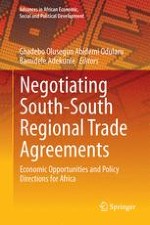2017 | OriginalPaper | Buchkapitel
Leveraging Trade Facilitation (TF) Measures to Maximize the Benefits of Regional Trade Agreements (RTAs) in West Africa
verfasst von : Gbadebo Odularu, Adenike Odularu
Erschienen in: Negotiating South-South Regional Trade Agreements
Aktivieren Sie unsere intelligente Suche, um passende Fachinhalte oder Patente zu finden.
Wählen Sie Textabschnitte aus um mit Künstlicher Intelligenz passenden Patente zu finden. powered by
Markieren Sie Textabschnitte, um KI-gestützt weitere passende Inhalte zu finden. powered by
